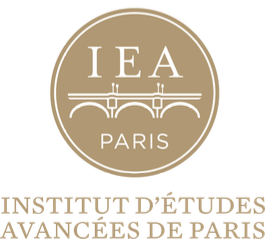Paris IAS
17 Quai d'Anjou
75004 Paris
contact:
Eloise Lehujeur
Communications manager
eloise.lehujeur@paris-iea.fr

The Paris Institute for Advanced Study (Paris IAS) is an independent research entity created in 2011 that regroups 14 major universities and research institutions in the Ile-de-France Region (Université Paris 3 Sorbonne Nouvelle; Université Paris Cité; Université Paris-Nanterre; Sorbonne Université; Université Paris 1 Panthéon Sorbonne, Université Paris-Saclay; Université Gustave Eiffel; École pratique des hautes études; École des hautes études en sciences sociales; École normale supérieure; Inalco-Institut National des Langues et Civilisations Orientales; Fondation Maison des Sciences de l’Homme, Institut national de recherche agronomique - INRAE, Centre national de recherche scientifique - CNRS. It benefits from the strong support of two founding members, the Ville de Paris (City of Paris) and the Ile-de-France Region, which have provided the IAS with first-class facilities for work and for residents’ accommodation, along with the French Ministry for Education, Research and Innovation through the Labex RFIEA+, for invitations and research projects, and the European and Global networks of IAS (NetIAS and UBIAS).
Fellows are high-level international researchers. FIAS fellowships at the Paris IAS are meant to provide them with outstanding research conditions and unfragmented time to develop an innovative, trans-disciplinary, and field-changing research project of their choice in the social and human sciences, neurosciences, and humanities. With Paris being the largest grouping of scientists in Europe, Fellows will be in the midst of this scientific hive, with easy access and opportunities to interact closely with local colleagues and other Fellows.
In the FIAS program, the Paris IAS offers 10-month fellowships, from September 1st to June 30th.
Premises and facilities
The Paris IAS is located in the Hôtel de Lauzun, a 17th century mansion in the very heart of Paris, on the Île Saint-Louis.
The Fellows benefit from workspaces and access to IT infrastructure, in-house research facilities and other relevant resources (including special access to a network of university libraries in Paris and a document delivery service at the Institute), as well as logistical and financial support for the organization of scientific events or for other initiatives related to their work (intersectoral collaborations, doctoral training, publications). The Paris IAS also provides fully equipped apartments to its Fellows in a building located in the park of the Cité universitaire internationale de Paris with easy access to the Institute.
Scientific priorities in FIAS
The Fellows’ projects at the Paris IAS can be in any disciplines and themes in the social sciences and humanities (SSH), including related fields.
Nevertheless, the Paris IAS aims to support projects that do more than just add another brick to the wall of conventional knowledge, andfunds groundbreaking, far reaching interdisciplinary research that helps inform the big scientific and social questions of our times. Accordingly, the different selection instances of the fellowship place a strong emphasis on the following 4 criteria:
- Scientific excellence and innovation of the research project and the candidate.
- Scientific ambition: capacity to offer insights into the functioning of humans and societies, beyond the researcher’s own discipline, field, and academia.
- A strong interdisciplinary aspect.
- Solid plans for collaboration with local scientific institutions, other Fellows, and the Greater Paris research community.
The selection process is highly competitive. Projects that do not respond explicitly to all four criteria will not be considered.
The Paris IAS values collective intelligence and interdisciplinarity. Fellows are expected to contribute generously to discussions and to the communal life of the Institute, during the compulsory weekly internal seminar, lunches together, and beyond. They will also be requested to give at least one public lecture.
In addition to these criteria, Fellows can choose to participate in our thematic programmes. This is not mandatory, but it can provide selected fellows with additional opportunities for collaboration and outreach. For the 2026-2027 period, we welcome applications that are compatible with the following programme:
- City of Paris programme – Open to projects in any discipline and any topic around the city of Paris or address challenges relevant to it. Applicants to this programme must clearly demonstrate the relevance of their project to understanding contemporary issues faced by the city. Proposals related to education—particularly regarding diversity and access—and urban mobility are especially encouraged.
Solid plans for collaboration with the member institutions of the Paris IAS, with local scientific institutions, and the Greater Paris research community, are most welcome. Here is the list of the Paris IAS members:
- INRAE
- CNRS
- École des Hautes Études en Sciences Sociales
- École normale supérieure - PSL
- École Pratique des Hautes Etudes - PSL
- Fondation Maison des sciences de l'homme
- Inalco
- Sorbonne Université
- Université Paris I Panthéon Sorbonne
- Université Paris 3 Sorbonne Nouvelle
- Université Paris Cité
- Université Gustave Eiffel
- Université Paris Nanterre
- Université Paris-Saclay.
Do not hesitate to contact them and/or their research centers and labs to discuss potential collaborations that would strengthen your research project.
For more information see https://www.paris-iea.fr.